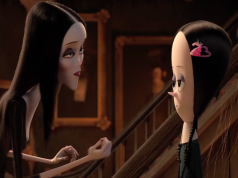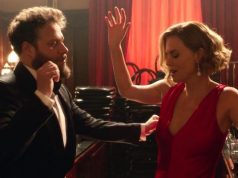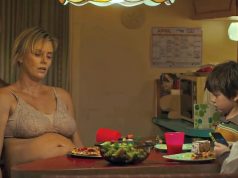
There’s something broken in my head that causes me to like and respect Laika’s stop-motion animated films without falling in love with them, some emotional circuit that’s not being completed. “Coraline” was brilliantly twisted enough for it not to matter that it didn’t have much heart. But then came “ParaNorman” (fine), “The Boxtrolls” (same), and now “Kubo and the Two Strings,” an ambitious, beautiful, imaginative creation of painstaking detail … that left me cold. Admiring, but cold.
I’m the worst. You shouldn’t listen to me.
Created with models, miniatures, and puppets (with some CGI for the backgrounds), the film, set in feudal Japan, features a young boy named Kubo (voice of Art Parkinson), an eye-patched li’l scamp who spends his days delighting villagers in the public square with his storytelling. (“If you must blink, do it now” is how the story always begins — a masterful opening line.) Kubo’s got some magic in him: when he plays his shamisen, scraps of paper fold themselves into intricate origami figures that act out the tale as he narrates it.
His bereft mother, who sits forlorn in a cave, reports that his father was a brave samurai, and that her own father and sisters are the ones who took Kubo’s missing eye. Kubo’s grandfather, it turns out, is a vengeful god called the Moon King (Ralph Fiennes), and his aunts are kabuki-faced witches who speak in unison (with Rooney Mara’s voice). To defeat them and save the universe, Kubo must find three mystical pieces of armor that belonged to his father, as described in the stories he’s been telling every day.
Brave young Kubo makes two new friends on his quest. First is a wooden monkey charm he’s had his whole life that now becomes a real, talking Monkey (Charlize Theron). For a monkey, she is very serious, and concerned about Kubo’s safety. His other helper is Beetle (Matthew McConaughey), an amnesia-stricken but courageous samurai who has been turned halfway into a man-sized beetle, and whose somewhat looser attitude causes amusing friction with Monkey. Providing silent comedy is a very expressive origami samurai brought to life by Kubo’s innate magic.
Our review of “Kubo and the Two Strings” from the Movie B.S. with Bayer and Snider podcast:
The original screenplay is credited to Marc Haimes and “ParaNorman” director Chris Butler, and was directed by Laika CEO Travis Knight, an animator taking his first turn at the helm. Creating such an elaborate, fanciful world from scratch is an impressive feat — you’d assume the film was based on a preexisting fictional mythology, but nope — and it speaks to the Laika group’s commitment to detail and precision. Laika displays the same attitude Pixar used to have: since it takes years to make one of these suckers, there’s no excuse not to get it right.
And there’s nothing I don’t like about “Kubo and the Two Strings.” The story, which is about stories, and how we believe the stories we’re told, is tight and well-structured. It offers moments of outstanding humor, scary action, and intense conflict. Visually, it’s a stunning piece of work.
So what’s missing? Something I can’t put my finger on — some last bit of spark or oomph or magic that would make it connect on a personal level. It just needs electricity to bring it to life.
For me, anyway. Like I said, you shouldn’t listen to me. Many of my friends and colleagues report being enraptured with everything Laika has produced, including this. All I can tell you is my own experience with the film, which left me amazed at the artistry involved, entertained by the story, but emotionally unmoved. I respect the heck out of it, though.
B (1 hr., 41 min.; )





